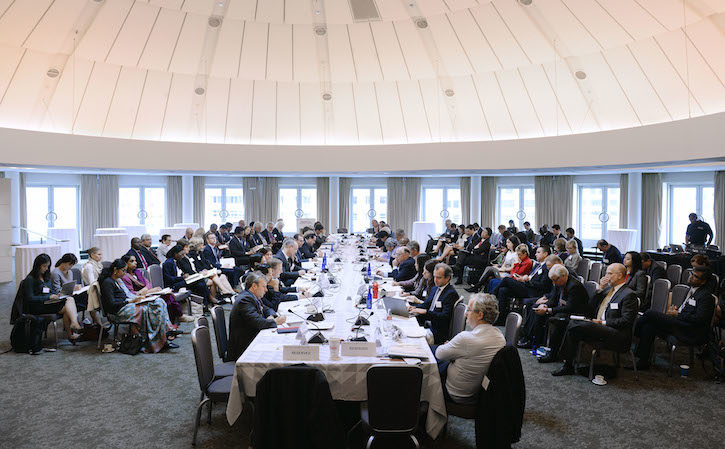
On the margins of the International Monetary Fund/World Bank fall meetings, senior level international and U.S. experts convened for the “Greening the Financial System: From Momentum to Transformation” conference on October 7th, 2016 in Washington, DC.
The Paulson Institute hosted the afternoon conference with the Bloomberg Philanthropies, International Institute of Finance, Securities Industry and Financial Markets Association (Sifma), the Toronto Center, and U.N. Environmental Protection Agency in organizing the conference that gathered experts from different sectors to discuss how to maintain the existing momentum about green finance and turn concepts into reality. While enthusiasm in the issue has grown over the last year, green finance still accounts for a small percent of the overall existing financial infrastructure.
The well-attended conference included G20 Green Finance Group members, central bank governors, representatives from international finance ministries, environmental ministers, investment and commercial banks, institutional investors, insurance firms, rating agencies, universities, think tanks and NGOs.
During the first session, “Greening the Financial System,” senior policy leaders and executives from the financial industry provided their perspectives on the progress made in advancing green finance. The discussion, moderated by Simon Zadek, co-Director of UNEP Inquiry, placed emphasis on future prospects for a greener future, as well as what steps the international community and the private sector can take to promote the green transformation of the global economy. Panelists included high-level government officials, who argued that green finance is essential to the future competitiveness and economic growth of their countries.
They also highlighted the release of the recent UNEP report “The Financial System We Need: From Momentum to Transformation.” This report notes the growing momentum for green finance, but stresses that this momentum is still not enough to promote significant transformation to a global low carbon economy. Panelists argued that the growing middle class and opportunities stemming from increased urbanization will translate into massive global investments in infrastructure. They noted that governments should create the circumstances to ensure that this increased investment is done in a more sustainable manner.
Session two, “Green Finance and the G20,”moderated by Michael Sheren, Senior Advisor for the Bank of England and Co-Chair of the G20 Green Finance Study Group, focused on exploring the challenges to the green finance industry and options that the G20 under Germany’s leadership might consider for enhancing green investment and finance. The panel, made up primarily of members of the G20 study group, highlighted some of the challenges facing governments in developing the appropriate regulatory policy. Germany also reiterated that it will maintain the Green Finance Study Group under its Presidency of the G20, and will dive deeper into the overall issues. It’s likely focus will be in two areas: one, to enhance disclosure requirements and, two, to explore different types of assessment tools.
Deborah Lehr, senior advisor at the Paulson Institute, led the discussions for the third session, “Green Finance: Going to Scale.” A main issue discussed was that despite growth in green finance, momentum must be sustained in order to promote economic growth and also help countries meet their climate commitments under the Paris Agreement. The panelists discussed steps needed to establish green banking systems, further develop green bond markets, and catalyze greater participation by issuers and investors.
The final panel of the day, moderated by Martin Wolf of the Financial Times, focused on the challenges and opportunities in catalyzing transformation of green finance from the current momentum, highlighting the importance of national action in informing and driving international cooperation, and the critical importance of collaboration. The panel included several high-level officials as well as senior executives from the private equity and insurance sectors.
The panelists highlighted key points that were a consistent theme throughout the day. One, disclosure requirements must be improved for investors to make informed decision. Two, governments must create appropriate frameworks for green finance to succeed, including establishing incentives and disincentives to guide behavior.
Yi Gang, Vice Chairman of the People’s Bank of China, gave the wrap up keynote address. He is responsible for overseeing China’s ambitious agenda for green finance, and emphasized in his remarks how China plans to continue to move aggressively in implementing its comprehensive plan for green finance in China. Its green bond market, just launched last December, is already the largest in the world. And plans exist to launch what will be come the world’s largest carbon exchange, if successfully launched last year.
The co-hosts will prepare a summary document of the conference with recommendations, which will be submitted to the G20 Green Finance Study group to be considered in it deliberations.


